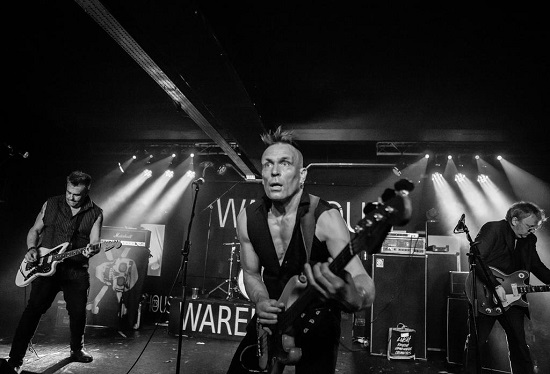The Membranes are to play a special celebratory show at the 12 Bar Club in Soho on Saturday, December 20, before it gets demolished in the new year. They’ll be previewing their upcoming double-album Dark Matter/Dark Energy prior to its release on Cherry Red in February.
Hailed as one of the most iconic venues on Denmark Street, the 12 Bar Club has been hosting the greatest names in British popular music since the 1950s. Denmark Street, aka Tin Pan Alley, was the place where David Bowie recruited his first backing band and where Jimi Hendrix hung out during his time in London. The Rolling Stones recorded many of their early hits there and the Small Faces formed there in 1965.
The venue is set for demolition to allow for "modernisation" in the area, despite much of Denmark Street holding listed status, a move that follows the axe falling on other small London venues, including Madame JoJo’s and Buffalo Bar.
Support for the night comes from psychotic pop band Faerground Accidents, London rockers The November Five, featuring tQ scribe Julian Marszalek, and tQ’s own John Doran, who will be playing a set that spans pre-Second World War satanic blues, Moroccan desert rock, Syrian dabke and modern British feminist punk.
John Robb, bassist and vocalist in The Membranes and long-standing friend of tQ, spoke to us about what the 12 Bar Club means to him.
Why is the 12 Bar Club so important?
John Robb: The UK has an international reputation for producing great music and music scenes. The patchwork of small venues is crucial to this culture. All those stadium-filling bands that developers clap their hands out of time to in their champagne royal boxes would not exist without these venues. Spaces like this are part and parcel of our culture.
The other thing is we are now having a battle for the soul of our cities. Are we to allow our cities to become the playgrounds for the idle rich and the powder-nosed bankers when they should be for everyone from all-night rock & rollers to young children to pensioners, from the rich to the poor, and not just the tasteless elite?
Venues like this are important because they breed culture, they are the heartbeat of communities and are where people meet and ideas are sparked.
What do you make of the trend of smaller venues, like Madame JoJo’s and the Buffalo Bar, closing?
JR: London seems particularly bad at keeping its culture. Manchester lost the Twisted Wheel recently and that was a real shock, even Night And Day survived the ridiculous whining of a resident who had moved in to a flat next door and complained about the noise 20 years after the venue was established.
Twisted Wheel was the famous club that sparked Northern Soul and has been turned into a cheap German hotel that looks like a KGB interrogation centre. Fortunately, that has been it so far and venues are booming in the northern city.
The rest of the country seems to be under siege now and we can’t allow this to happen. The bankers and the super-rich are out of control, they know they can do what they want. They have their ‘chums’ in Downing Street (who seem to have forgotten that their ‘beloved’ Smiths started in similar small venues) as well as local councils in their pampered and cash-filled back pockets, leaving them free to spread their filthy corporate concrete cancer all over the place, which is wrecking our lives. How many Starbucks and Costa Coffees does one city need?
How will you remember the 12 Bar Club?
JR: The people who manage the place, like Barnet Mark, are great people. They are key in the patchwork of our culture. The venue is tightly packed, eminently friendly and a stopping-off point for people from all over the world trying to find a friendly face in the city. We have swung from the roof and laughed in the gutter in this venue, and this weekend’s gig is going to be a wild and noisy celebration of just how important this culture and these venues are.
Get hold of tickets to the gig here


